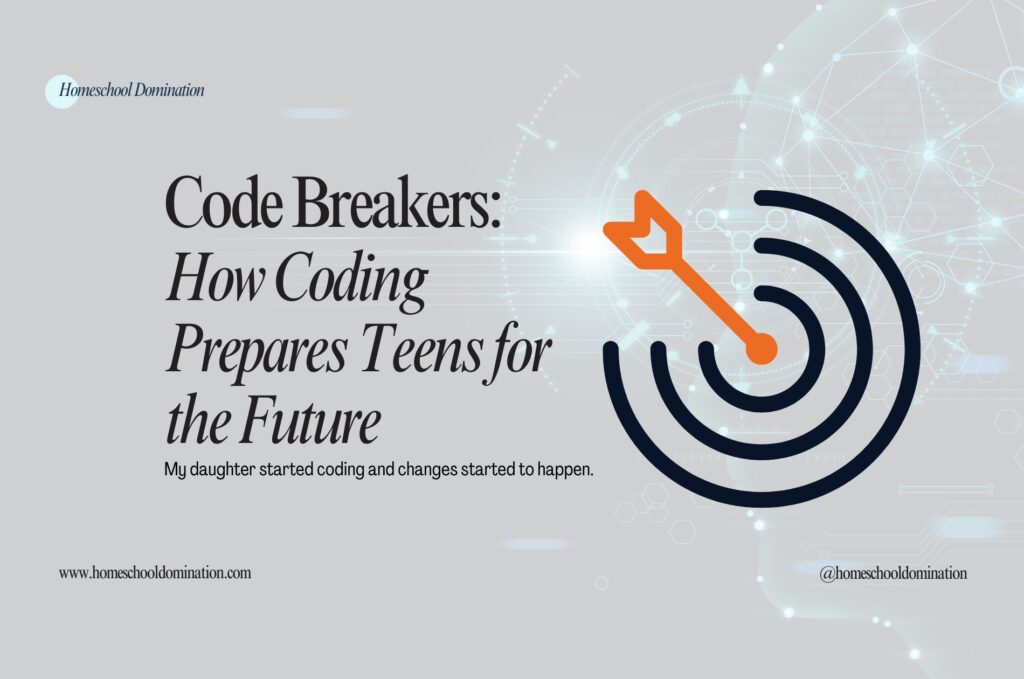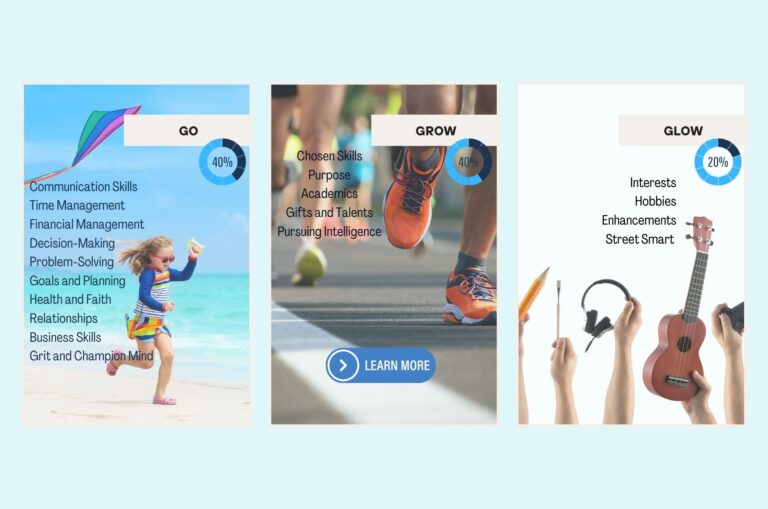Why Coding Empowers Teens: 13 Powerful Ways It Builds a Future-Ready Mindset
I grew up loving technology and self-taught myself on how to code and as I grew older, I continuously reap the benefits of coding. Having seen the benefits on how coding can prepare me for the future, I started to coach my daughter on how she can learn how to code because coding empowers teens. I pointed her to different sites that she can started with. In few days, she started to code. She just accelerated from there. Then, all these changes started to happen.
- She is more patient when solving problems.
- She more independent in her Math problems, and other learning activities.
- She became creative through programs that can help her memorize efficiently for her Bible quizzing.
- She is more mature on how she thinks and applies those before making decision.
- She questions more, and started asking, how can I improve this.
- She is more confident.
- She feels empowered.
Coding and eventually programming is essential to prepare your teens for the future. Especially in today’s learning wherein it becomes more technology-centric. Some parts of technology is scary but you will need to separate the part of technology that is scary vs the part is about learning.

How Coding Empowers Teens for the Future
1. Builds Problem-Solving Skills
Two days ago, we bought a tiny waffle maker with removable plates. After using it for few times, the bottom plate does not snap properly. For a while, I thought I was ready to retire that waffle maker after just two days of use. Before finally retiring, since we have the batter ready, I asked my daughter to make a waffle and she realizes that the bottom plate does not snap properly, her initial reaction was, “Let us troubleshoot it!”
So she did. She unplug the waffle maker. Use some fork to check what was going on. After five minutes, the plate started to snap.
Troubleshooting and problem-solving becomes naturally occurring to her. Instead of using the waffle maker at its state, she decided to troubleshoot it.
Coding teaches teens to break down complex problems into smaller, manageable steps and solve them logically. These skills extend beyond programming and are valuable in everyday life.
2. Encourages Creativity
Coding is about creating. You’re bringing some boring things into life. She does Teen Bible Quiz and she has to memorize chapters of Bible verses for monthly meet. She started to use her Python coding skills to create a program wherein the program will give her question about a specific section and she will answer the question. The program will print the answer when she’s ready.
She created her own data file that has the verses. Then, she created the program to give her question and the answer when she needs it.
Every time there is a need for her to learn more efficiently, she creates a program for it.
Even better, some of her creativity doesn’t involve coding. She decided to record the verses so that she can play it again and again, thus creating another memorizing channel via audio learning.
Now she creates other things related to technology. She is building her own website. She helps her sister bounce ideas on what to draw. She also uses that creativity to compose new songs, make jewelries, and learn insane piano pieces.
Coding is as much an art as a science. Teens can create games, apps, websites, and digital art, allowing them to express their creativity in new and exciting ways.
3. Teaches Persistence and Resilience
Programming often involves debugging and troubleshooting, teaching teens to persevere through challenges and learn from mistakes—a vital life skill.
The same student plays two sports: golf and tennis. When she plays golf, she needs to troubleshoot the terrain especially when her ball went to the bunker or in the water or nowhere near the green or the fairway.
When she plays tennis, she needs to troubleshoot her opponent or herself when she’s losing points.
All these activities of her require a lot of troubleshooting. Coding helps her exercise this part of her brain. So that when she goes out in the field and play, her brain is equipped with it.
4. Boosts Logical Thinking
Coding helps develop critical thinking and logical reasoning as teens learn to follow patterns, think systematically, and anticipate outcomes.
When we are on long car rides, I love giving my kids logical problems to solve. This makes them think and sometimes it creates more logical conversation along the way, until we no longer have sense. (Actually the most fun part).
If starts with simple logic as if P then Q. If it rains today (P), then the ground is wet (Q). Then they would start thinking a sample logic of “If P, then Q”.
Coding, most of the time, requires a lot of conditional loop to make your program work. If (this sentence is true), do this. If (this sentence is true and this sentence is false), do this. So there are several logical combinations that they can do.
These also applies to several math problems wherein they have to find patterns in order to solve a problem. One simple example is dealing with positive and negative number. For example, multiply + and + equals +, which equates to true and true equals true.
They also apply the same when solving multiple equations in Algebra. They look for patterns and apply those patterns when solving problems.
5. Provides Entrepreneurial Opportunities
Teens who code can launch their own apps, start tech-based businesses, or create digital products, opening doors to entrepreneurial ventures at a young age.
Remember that code she created for her teen bible quiz? She went up to me one day and asked me on how she can packaged her program so that she can share it with others. So there is an opportunity there to share what they have created.
We started looking into it and it is like opening a pandora box! We start delving into other realm of entrepreneurship like filing for a trademark, and submitting a patent. At 15, she is on her way to establish her own business.
6. Makes Technology Less Intimidating
Learning to code demystifies how computers and software work, empowering teens to understand, control, and even innovate with technology rather than passively consume it.
Making your teen comfortable with technology actually protects them from negative effects of technology. They learned to create content instead of consuming contents that makes them passive. They learned how not to click a link for unknown sources because that might mean phishing and hacking.
They learn how AI technologies can teach them and help their work faster. Like being able to write a blog in a day.
They learn several technology tools which allows them to create faster and be more productive than they were. They learn how technology can help them.
They learn the ill-effects of social media so they avoid it for personal consumption and use it for marketing purposes. They learn which part of technology they should be learning and which part they should be avoiding.

7. Promotes Collaboration and Teamwork
Coding often involves teamwork, whether through pair programming, contributing to open-source projects, or participating in hackathons, helping teens develop collaboration skills.
If your child is lucky enough to find a community who has the same bandwidth, the collaboration and teamwork will be unbelievable. For now, my teen collaborates with her sister as they brainstorm what to create depending on their skills.
8. Connects to Other Subjects
Programming enhances learning in math, science, engineering, and even art. For example, coding can bring geometry to life through game design or integrate with music composition.
Since my daughter started coding, I realized that she became more independent with other learning activities. She knows where to find resources for math. Recognizing the patterns and using logic to solve problems.
She is also able to use this in her quizzing and during sports competition like tennis.
9. Opens the Door to STEM Careers
Learning to code gives teens a head start in pursuing careers in science, technology, engineering, and mathematics, where demand for skilled professionals continues to grow.
Almost all industries are now using technologies to manufacture. Someone has to provide programming to that machine. That is where a coder can come in. Good news is that once a programmer learns a programming language, other programming languages would be easier to learn.
With technology driving almost every industry, coding skills are becoming essential. Teens who learn to code gain a competitive edge in fields like tech, healthcare, engineering, design, and more.
10. Fosters Independence and Empowerment
The first time I wrote my own code and run it, I felt that sense of accomplishment. Can you imagine the confidence I gain when I first troubleshoot a code and it worked? I felt like there is no bug I can’t resolve. It became a reality. I can almost debug any code that is given to me.
After being able to debug code, I became more confident in solving other problems that came my way. The positive self-talk of saying, “There is nothing I can’t resolve,” is already a confidence-maker.
Creating functional programs gives teens a sense of accomplishment and independence. They learn that they can build tools to solve real-world problems. They are not there to just code, they can resolve real-world problems.
11. It’s Fun and Rewarding
Not to mention that fun and rewards that come with every code completed and every program that solve several problems.
The very first programming (I called it more as scripting) project I had was to produce a quarterly report that is used by the bank to check on branch profitability. The manual process took about six (6) weeks to produce.
Using scripts, I automated the actual computation and she need to go was to put import the inputs and click the Process button. In few hours, the report is produced. The person doing the job, almost adopted me for being very happy. She has almost quit her job because she thought it was the most boring part but after the automation she had time to learn scripting with me so that she can automate other reports that will come her way.
Coding can feel like solving puzzles or playing with Lego bricks—there’s a sense of joy and satisfaction in creating something from scratch.
12. Encourages Lifelong Learning
Twenty years ago, I would need to wait for one month, if I’m lucky, for my book order to arrive. I grew up in Asia and when I order books from the United States, it would take more than a month before I would receive it. Today, I can listen to it as soon as I learned about the book. I don’t even have to wait for the actual book to arrive. I still prefer to read the actual book for better absorption but being able to have a head start using Audibles makes learning easier.
With the technology continually evolving, new programming language comes into life. Which means more to learn. It becomes an evolving learning journey. Your teens can get the same journey, too.
Technology evolves rapidly, and coding instills a mindset of continuous learning, which is essential for adapting to a fast-changing world.
13. Develops Digital Literacy
In a world increasingly dominated by technology, knowing how to code enhances teens’ understanding of the digital tools and systems they use daily. They become more confident in what they do.
Coding equips teens with the tools to shape their futures and contribute to a world that increasingly runs on technology. It’s more than just a technical skill—it’s a way to think, create, and thrive.
Want more homeschool advice? Are you a parent looking for resources to homeschool your kids? Are you a student homeschooling for the first time and needs help in your learning skills, follow us in Instragram for updates about our articles and additional resources.





